#Medical debt reduction
Explore tagged Tumblr posts
Text
The Impact of Health Advocacy on Chronic Disease Management
Managing chronic diseases requires ongoing attention and coordination among various healthcare providers. Health advocates play a pivotal role in this process by ensuring consistent and coherent care. They help patients adhere to treatment plans, manage medications, and communicate effectively with multiple healthcare professionals. Advocates also provide support in lifestyle management, such as diet and exercise, which are crucial for chronic disease management. By offering continuous support and guidance, health advocates improve quality of life and health outcomes for patients with chronic conditions.
0 notes
Text
Look.

I have made you a chart. A very simple chart.
People say "You have to draw the line somewhere, and Biden has crossed it-" and my response is "Trump has crossed way more lines than Biden".
These categories are based off of actual policy enacted by both of these men while they were in office.
If the ONLY LINE YOU CARE ABOUT is line 12, you have an incredible amount of privilege, AND YOU DO NOT CARE ABOUT PALESTINIANS. You obviously have nothing to fear from a Trump presidency, and you do not give a fuck if a ceasefire actually occurs. You are obviously fine if your queer, disabled, and marginalized loved ones are hurt. You clearly don't care about the status of American democracy, which Trump has openly stated he plans to destroy on day 1 he is in office.
EDIT:
Ok fine, I spent 3 hours compiling sources for all of these, you can find that below the cut.
I'll give at least one link per subject area. There are of course many more sources to be read on these subject areas and no post could possibly give someone a full education on these subjects.
Biden and trans rights: https://www.hrc.org/resources/president-bidens-pro-lgbtq-timeline
Trump and trans rights: https://www.aclu.org/news/lgbtq-rights/trump-on-lgbtq-rights-rolling-back-protections-and-criminalizing-gender-nonconformity
The two sources above show how Biden has done a lot of work to promote trans rights, and how Trump did a lot of work to hurt trans rights.
Biden on abortion access: https://www.cnn.com/2022/07/08/politics/what-is-in-biden-abortion-executive-order/index.html
Trump on abortion access: https://apnews.com/article/abortion-trump-republican-presidential-election-2024-585faf025a1416d13d2fbc23da8d8637
Biden openly supports access to abortion and has taken steps to protect those rights at a federal level even after Roe v Wade was overturned. Trump, on the other hand, was the man who appointed the judges who helped overturn Roe v Wade and he openly brags about how proud he is of that decision. He also states that he believes individual states should have the final say in whether or not abortion is legal, and that he trusts them to "do the right thing", meaning he supports stronger abortion bans.
Biden on environmental reform: https://www.whitehouse.gov/briefing-room/statements-releases/2021/10/07/fact-sheet-president-biden-restores-protections-for-three-national-monuments-and-renews-american-leadership-to-steward-lands-waters-and-cultural-resources/
Trump on environmental reform: https://www.nytimes.com/interactive/2020/climate/trump-environment-rollbacks-list.html
Biden has made major steps forward for environmental reform. He has restored protections that Trump rolled back. He has enacted many executive orders and more to promote environmental protections, including rejoining the Paris Accords, which Trump withdrew the USA from. Trump is also well known for spreading conspiracy theories and lies about global climate change, calling it a "Chinese hoax".
Biden on healthcare and prescription reform: https://www.hhs.gov/about/news/2023/06/09/biden-administration-announces-savings-43-prescription-drugs-part-cost-saving-measures-president-bidens-inflation-reduction-act.html
Trump on healthcare reform: https://www.cnn.com/2024/01/07/politics/obamacare-health-insurance-ending-trump/index.html
I'm rolling healthcare and prescriptions and vaccines and public health all into one category here since they are related. Biden has lowered drug costs, expanded access to medicaid, and ACA enrollment has risen during his presidency. He has also made it so medical debt no longer applies to a person's credit score. He signed many executive orders during his first few weeks in office in order to get a handle on Trump's grievous mishandling of the COVID pandemic. Trump also wants to end the ACA. Trump is well known for refusing to wear a mask during the pandemic, encouraging the use of hydroxylchloroquine to "treat" COVID, and being openly anti-vaxx.
Biden on student loan forgiveness: https://www.ed.gov/news/press-releases/biden-harris-administration-announces-additional-77-billion-approved-student-debt-relief-160000-borrowers
Trump on student loan forgiveness: https://www.forbes.com/sites/adamminsky/2024/06/20/trump-knocks-bidens-vile-student-loan-forgiveness-plans-suggests-reversal/
Trump wants to reverse the student loan forgiveness plans Biden has enacted. Biden has already forgiven billions of dollars in loans and continues to work towards forgiving more.
Infrastructure funding:
I'm putting these links next together because they are all about infrastructure.
In general, Trump's "achievements" for infrastructure were to destroy environmental protections to speed up projects. Many of his plans were ineffective due to the fact that he did not clearly outline where the money was going to come from, and he was unwilling to raise taxes to pay for the projects. He was unable (and unwilling) to pass a bipartisan infrastructure bill during his 4 years in office. He did sign a few disaster relief bills. He did not enthusiastically promote renewable energy infrastructure. He created "Infrastructure Weeks" that the federal government then failed to fund. Trump did not do nothing for infrastructure, but his no-tax stance and his dislike for renewable energy means the contributions he made to American infrastructure were not as much as he claimed they were, nor as much as they could have been. Basically, he made a lot of promises, and delivered on very few of them. He is not "against" infrastructure, but he's certainly against funding it.
Biden was able to pass that bipartisan bill after taking office. The Bipartisan Infrastructure Plan that Trump tried to prevent from passing during Biden's term contains concrete funding sources and step by step plans to rebuild America's infrastructure. If you want to read the plan, you can find it here: https://www.whitehouse.gov/build/guidebook/. Biden has done far more for American infrastructure than Trump did, most notably by actually getting the bipartisan bill through congress.
Biden on Racial Equity: https://www.npr.org/sections/president-biden-takes-office/2021/01/26/960725707/biden-aims-to-advance-racial-equity-with-executive-actions
Trump on Racial Equity: https://www.axios.com/2024/04/01/trump-reverse-racism-civil-rights https://www.bbc.com/news/av/world-us-canada-37230916
Trump's racist policies are loud and clear for everyone to hear. We all heard him call Mexicans "Drug dealers, criminals, rapists". We all watched as he enacted travel bans on people from majority-Muslim nations. Biden, on the other hand, has done quite a lot during his term to attempt to reconcile racism in this country, including reversing Trump's "Muslim ban" the first day he was in office.
Biden on DEI: https://www.whitehouse.gov/briefing-room/presidential-actions/2021/06/25/executive-order-on-diversity-equity-inclusion-and-accessibility-in-the-federal-workforce/
Trump on DEI: https://www.msn.com/en-us/news/politics/trump-tried-to-crush-the-dei-revolution-heres-how-he-might-finish-the-job/ar-BB1jg3gz
Biden supports DEI and has signed executive orders and passed laws that support DEI on the federal level. Trump absolutely hates DEI and wants to eradicate it.
Biden on criminal justice reform: https://time.com/6155084/biden-criminal-justice-reform/
Trump on criminal justice reform: https://www.vox.com/2020-presidential-election/21418911/donald-trump-crime-criminal-justice-policy-record https://www.theatlantic.com/politics/archive/2024/05/trumps-extreme-plans-crime/678502/
From pardons for non-violent marijuana convictions to reducing the federal government's reliance on private prisons, Biden has done a lot in four years to reform our criminal justice system on the federal level. Meanwhile, Trump has described himself as "tough on crime". He advocates for more policing, including "stop and frisk" activities. Ironically it's actually quite difficult to find sources about what Trump thinks about crime, because almost all of the search results are about his own crimes.
Biden on military support for Israel: https://www.nbcnews.com/politics/national-security/biden-obama-divide-closely-support-israel-rcna127107
Trump on military support for Israel: https://www.vox.com/politics/353037/trump-gaza-israel-protests-biden-election-2024
Biden supports Israel financially and militarily and promotes holding Israel close. So did Trump. Trump was also very pro-Israel during his time in office and even moved the embassy to Jerusalem and declared Jerusalem the capitol of Israel, a move that inflamed attitudes in the region.
Biden on a ceasefire: https://www.usatoday.com/story/news/world/2024/06/05/gaza-israel-hamas-cease-fire-plan-biden/73967659007/
Trump on a ceasefire: https://www.nbcnews.com/politics/donald-trump/trump-israel-gaza-finish-problem-rcna141905
Trump has tried to be quiet on the issue but recently said he wants Israel to "finish the problem". He of course claims he could have prevented the whole problem. Trump also openly stated after Oct 7th that he would bar immigrants who support Hamas from the country and send in officers to American protests to arrest anyone supporting Hamas.
Biden meanwhile has been quietly urging Netanyahu to accept a ceasefire deal for months, including the most recent announcement earlier in June, though it seems as though that deal has finally fallen through as well.
103K notes
·
View notes
Text

www.debtcrusherpro.com
1 note
·
View note
Text
Credit Repair of San Antonio
Good credit opens many doors. Credit to start a company or rent a new property depends on your credit score. Credit Repair of San Antonio's credit monitoring services help you monitor your credit report. Free annual credit reports are nice, but they're not great for managing money.
Correct credit report errors and monitor changes. Our professional credit counselors have helped thousands of people improve their credit scores. San Antonio Credit Repair's credit monitoring services will help you.
Credit Repair of San Antonio has a team of credit repair and rehabilitation experts who help customers remove negative information from their credit reports. Each member will be assigned a credit specialist to examine their credit scores, credit habits, and identity theft concerns.










#late payment removal#credit restoration#credit repair#collection removal#charge off removal#tax lien removal#debt reduction#identity restoration#student loan services#credit consolidation#inquiry removal#medical billing removal
1 note
·
View note
Text
Things the Biden-Harris Administration Did This Week #33
Sep 6-13 2024
President Biden marked the 30th anniversary of the passage of the Violence Against Women Act and highlighted efforts to stop gender based violence. the VAWA was written by then Senator Biden and he often talks about it as his proudest legislative victory. The act transformed how the federal government dealt with domestic violence, sexual assault, and stalking. In part because of the connection to Joe Biden, President Trump and the Republicans allowed the VAWA to expire in 2019. President Biden passed a new reauthorization, with new protections for women against cyber crime, in 2022. On the VAWA's 30th anniversary President Biden announced $690 million in grants to support survivors of gender-based violence.
President Biden and Vice-President Harris announced a new rule to force insurance companies to treat mental health care the same as medical care. The new rule takes on the use by insurance of restrictive practices like prior authorization, and out of network charges, it also closes a loophole in the law that allowed state and local government health insurance not to cover mental health.
The Biden-Harris administration announced that 50 million Americans, 1 in every 7, have gotten health insurance through Obamacare's marketplaces. Under Biden a record breaking 20.8 million enrolled this year. Since the ACA was passed by President Obama and then Vice-President Biden it has transformed American health care bring affordable coverage to millions and getting rid of "preexisting conditions". During the Presidential debate Vice-President Harris defended the ACA and the need to keep building on it. Trump after 9 years of calling for its repeal said he only had "concepts of a plan" on what to do about health care in America.
The IRS announced that it has recovered $1.3 billion in back taxes from wealthy tax dodgers. For years Republicans have tried to underfund the IRS hindering its ability to police high income tax payers. President Biden in his Inflation Reduction Act ensured that the IRS would have the money it needs to chase high income tax cheats. In February 2024 the IRS launched a program to go after over 100,000 people, making $400,000 or even over $1 million a year who have not filed taxes since 2017. The IRS also launched a program to collect from tax payers who make over $1 million a year who have uncontested debt of over $250,000. Between these two efforts the IRS has collected over a Billion Dollars in back taxes from the richest Americans, so far this year.
The Department of The Interior and White House Climate Advisor Ali Zaidi highlighted green energy efforts on public land. Highlighting two projects planned in Nevada officials talked about the 41 renewable energy projects approved on public land under the Biden-Harris Administration. These projects over 25 gigawatts of clean energy, a goal the Administration's climate plan set for the end of 2025 but met early this year. With the new projects in Nevada this is enough energy to power 12.5 million homes, and the Bureau of Land Management is another 55 utility-scale project proposals across the West.
The Department of The Interior announced $236 million to help fight forest fires and restore landscapes damaged by recent wildfires. Under President Biden's Bipartisan Infrastructure Law, the Administration has spent nearly $1.1 billion dollars to combat deadly wildfires which have over the last 10 years grown in size and intensity thanks to climate change.
The Department of The Interior announced $157 million in wetland conservation. The money is focused on protecting bird habitats. It will protect and preserve thousands of acres of wetlands across 7 states.
The US Senate approved President Biden's nominations of Adam Abelson, Jeannette Vargas, Mary Kay Lanthier, and Laura Provinzino to federal judgeships in Maryland, New York, Vermont, and Minnesota respectively. This brings the total number of federal judges appointed by President Biden to 209. When Biden entered office 318 district judges were Republican appointees and 317 Democratic, today 368 are Democratic appointments and just 267 are Republican. President Biden is the first President in history to have the majority of his appointments not be white men and he has appointed more black women to the bench than any President ever.
#Joe Biden#Thanks Biden#kamala harris#politics#political#US politics#American politics#climate change#domestic violent relationships#mental health#health care#health insurance#tax the rich#judges
792 notes
·
View notes
Text
The issue around treating medical school debt as a driver for problems of US doctor shortages, or distortions in distribution, is that any impact it has is just completely wiped out by the centrally controlled, government-backed reductions in the supply of doctors themselves. In a world where the supply of doctors was allowed to meet demand, debt would matter a good deal! It would be reducing your supply, making the marginal cost of becoming a doctor higher, and so reductions in the price of becoming one would boost the numbers you have, lower costs of treatment, etc etc.
But in the US that's all irrelevant because we slap a gigantic quota bar a thousand yards before those supply and demand lines ever intersect. You could demand blood sacrifices and the souls of their first born from med school applicants, demand for those slots is so high you wouldn't even notice. Being a doctor is the most reliable 1%'er job in the US at scale, it beats programmers and financial analysts easy. Any attempt to "boost supply" of doctors by making being a doctor *better* somehow is categorically incapable of doing that, because that is not what is constraining supply. Even the idea of boosting the salaries of pediatricians to get relatively more of them, while it can do something at the margins, is missing the point - your supply of doctors is fixed. You can only increase the number of pediatricians by *reducing the number of radiologists*. Who presumably do valuable work! The math is extremely harsh to any attempts at amelioration if you don't address the core problem.
136 notes
·
View notes
Text
Also preserved on our archive
Do you have $32,000 for covid treatment? Neither did Nannette, and now her whole family is paying the price for her covid hospitalization. This is why we must mask up: You may be able to afford that cost, but you are just as likely to spread covid to dozens who cannot if you refuse to take precautions, especially when ill.
By Noah Zahn
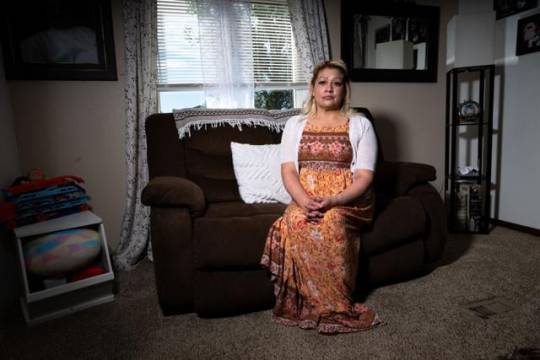
CHEYENNE — When Nannette Hernandez got COVID in 2021, she didn’t realize how long it would take to recover. Although she was released from the hospital after only a few days of care, she is still suffering from the financial burden that has led to the loss of her job and her home.
At 45 years old, Hernandez and her son, 26, moved in with her mother when she lost her home. The three of them now live together in a mobile home south of Cheyenne. The walls and tabletops are decorated with photos of family members, many of the frames containing photos of her three grandchildren.
Papers were strewn across the coffee table in the living room: bills from the hospital, letters to the hospital, research on how to get financial assistance, one letter denying financial assistance.
Although Hernandez says she tries to keep a positive attitude, her smile faded when she said she often feels hopeless as her debt continues to grow and she is considering filing for bankruptcy.
“They garnish my wages every week, and I owe them more now today than what the judgment was for, and that’s all due to the interest,” Hernandez said. “I’m never going to get through this, you know.” Toys are neatly put away in a corner of the room, behind the couch, for when her grandchildren come to visit on her days off work.
Hernandez has a new job and has health insurance. In addition, she contributes a portion of her wages to life insurance. She said she does this so that she at least has something she can pass on to her family.
Before interest, Hernandez’s bill from Cheyenne Regional Medical Center was around $32,000 after three days of care for COVID and related pneumonia and reduced to $22,000 because she was paying uninsured and out-of-pocket. Between garnished wages and paying for insurance, Hernandez says she only sees at most $12 of her $17.30 per hour wage from working at a deli in a truck stop.
Hernandez said she now suffers from depression as a result of the stress caused by her medical debt. It is difficult for her to work full 40-hour weeks at her job.
However, her smile returned as she talked about how she gets to spend time with her grandchildren, aged 2, 4 and 8, on her days off.
“They’re my light. Oh, they’re wonderful,” she said. “… I stay happy. I don’t let it give me misery, that’s one thing. I might carry it, and I might be right here, always talking about it, but very blessed, very happy, though, still, no matter what.”
Available funding The Provider Relief Fund (PRF) was established in the Coronavirus Aid, Relief, and Economic Security Act (CARES Act) to reimburse eligible health care providers for increased expenses or lost revenue attributable to COVID care.
A companion fund to the PRF is the Uninsured Funds, which made $10 billion available nationally to reimburse providers for treatment, vaccines and vaccine administration costs for care provided to uninsured individuals.
According to the U.S. Department of Health and Human Services, CRMC received $3,145,097 in Uninsured Funds for COVID treatment, accounting for nearly 30% of the Uninsured Funds received by care providers across the state. It is unclear whether these funds were what reduced Hernandez’s bill from $32,000 to $22,000. Her itemized bill notes the reduction as a discount for “self-pay, uninsured.”
Hernandez received her $22,000 bill shortly after she was released from the hospital and was summoned to court when she did not make payments. She did not appear in court, as she said she felt hopeless and afraid and knew she would be unable to pay. As a result, the court ordered the hospital to garnish 25% of her wages and any argument she had that the government should have assisted her financially was nullified.
After her hospitalization, Hernandez was forced to leave her job of 10 years, where she worked as a waitress, and was unable to work for three months while she stayed at home and was on oxygen 24 hours per day, due to COVID complications.
“I would like to see if they could reverse this, it’s not that I didn’t seek assistance. Now I’ll never get out of this, I’m never going to get out of this,” she said. “It started at $32,000. I’ve been paying on that this whole time. I had started working, they started garnishing right away. I owe them more now. What am I paying for? What am I working for?”
Additionally, Hernandez said she applied for and was denied CRMC’s financial assistance program. According to CRMC’s policy summary, CRMC determines whether patients qualify for financial assistance based on their income and household size compared to the Federal Poverty Guidelines from the HHS. In 2021, those guidelines stipulate that the threshold for a one-person household is $12,880 annual income.
“If being an uninsured waitress making $350 a week doesn’t qualify a person for financial assistance under your hospital’s charity policy, I’d like to know what does,” Hernandez wrote in an email to CRMC officials.
Hernandez sent this email to CRMC, the Center for Medicare & Medicaid Services and Wyoming government officials. In nearly two months, she only got a response from CMS, which informed her it never received an application submitted on her behalf for Wyoming Medicaid and she was not on Medicaid at that time.
Hernandez: “The prices, they’re outrageous”
In this letter, she also claims she was overcharged. On her itemized bill, she was charged $2,124.20 per 100 mg vial of Remdesivir. Gilead Sciences, the drug’s manufacturer, set the price of Remdesivir at $390 per vial for uninsured patients. Hernandez was charged for five vials for a total of $10,621 instead of what would have been $1,950 for five vials directly from the manufacturer.
Hernandez was charged $8.01 for each 20 mg tablet of famotidine, an acid reducer. This medication is commonly available over the counter and a pack of 225 20 mg tablets is available on Amazon for just under $9, equivalent to about $0.04 per tablet. At this rate, CRMC’s price for the medication is 19,825% higher than what can be purchased in store or online.
CRMC charged her the same price for each 100 mg tablet of thiamine mononitrate, more commonly known as a B1 vitamin. These can also be purchased in the pharmacy section of most grocery stores. A pack of 100 tablets can be found for $7, or $0.07 per tablet, more than 114 times less than the hospital’s price.
It is common for hospitals to charge more for medications, even if it can be purchased at a CVS or Walgreens, for charges associated with administering the drug to the patient. This may include factors like the doctor’s prescription, the pharmacy charge to fill the order, the transportation of the drug from the pharmacy to the medication unit, administration of the medication from the registered nurse to the patient and documentation that the correct medication was administered on the patient’s record.
However, Hernandez believes an 11,343% upcharge for a B1 vitamin may be a bit too much.
When she initially went to urgent care and got an X-ray scan, she was told to go to the emergency room immediately, and the providers at the urgent care said it was a matter of life or death. Without financial assistance or price transparency as her bills continued to grow, Hernandez felt disenfranchised and marginalized and is now fearful of the system that is supposed to provide care for her and the community. She said she is now afraid to ever get sick again.
“I feel it’s unjust. I should not be living every day with a heavy burden like this,” Hernandez said. “… I’m sure I’m not the only person this has happened to. I know there has to be so many more.”
Price transparency In 2022, the White House reported that one-in-three adults in the United States — nearly 100 million people — have medical debt. It is now the largest source of debt in collections — more than credit cards, utilities and auto loans combined. Data from the 2020 U.S. Census also found that Black and Hispanic households are more likely to hold medical debt than white households.
The U.S. spent 17.8% of gross domestic product on health care in 2021, nearly twice as much as the average economically developed country. However, the Peterson-KFF life expectancy tracker shows that the average American lifespan is nearly five years lower than those in the comparable country average and was about the same in 2022 as it was in 2004, while most other comparable countries’ life expectancies have increased since then.
Marni Carey is the president of Power to the Patients, a nonprofit organization advocating patients’ rights to upfront price transparency from hospitals.
“I get letters every day from people who are fighting medical debt, burdensome medical debt,” Carey said. “… It’s just a horrible place to be driven to. And if hospitals could tell patients in advance what their financial responsibility is, or if patients could look online and see what the cost of care is, they could choose providers that were affordable to them and competition could enter the marketplace and Tylenols wouldn’t be $80, they would be $5. That’s why we need transparency, so patients can have financial certainty when they go into the medical system.”
A February 2024 report from Patient Rights Advocate, a nonprofit advocating systemwide health care price transparency, found that nearly two-thirds of American hospitals were not compliant with the federal Hospital Price Transparency Rule, which took effect in January 2021, including CRMC. This legislation requires hospitals to make their prices publicly available and easily accessible online to help patients understand the cost of care before they receive it.
According to the report, CRMC is compliant with all transparency rules except for negotiated rates, which Patient Rights Advocate measured by whether the hospital posted the charge that the hospital has negotiated with a third-party payer for an item or service. They found CRMC lists 89% of its negotiated rates as “N/A.”
“I couldn’t go into the Cheyenne Regional Medical Center machine readable files and find out if (Hernandez’s) bill was at all correct, because the hospital doesn’t have that, they don’t comply,” Carey said.
CRMC officials declined to comment on this story, citing patient privacy.
“For privacy reasons, we can’t disclose patient medical treatment or billing details. We recently received a letter from Ms. Hernandez and we will review the medical and billing records and provide a response,” CRMC told the WTE in a statement. “As a general matter, please note that sending a bill to a collections agency and potentially sending an unpaid bill through a court process are last resorts, used only when someone does not respond to offers of financial assistance, billing statements and phone calls.”
At the time of publication, Hernandez said she has yet to receive a response from CRMC and never got any offer of financial assistance. The only correspondence she has received after her release from the hospital has been her bills and a letter stating she did not qualify for the hospital’s charitable care program.
No savings left Hernandez said she believes she would have been in a better situation now if she had more savings before she got COVID more than three years ago. She said she did have savings, but she had to burn through those savings when her father, who lived in California, passed and her grandmother, also in California, passed a month later. Between several trips to California and multiple funeral services, she said she had little savings remaining when she got sick.
“My dad’s burial cost took all my savings, everything, because I just wanted my dad to lay in peace, you know, I wanted to bury my father, and that took all my savings,” she said.
“It’s just like a train of events, such an unfortunate train of events in life that people go through. Everybody goes through it, and that was mine. I said, ‘Man, if I would have had all that money held just a little bit longer, I would not be in this right now.’”
#long covid#mask up#covid#pandemic#covid 19#wear a mask#coronavirus#sars cov 2#public health#still coviding#wear a respirator#covid conscious#covid is airborne#covidー19#covid isn't over#covid pandemic#covid19
28 notes
·
View notes
Text
Jeff Goldblum warning us in Jurassic Park that cloning dinosaurs is raping mother nature was apparently an instruction manual and not a warning.

"Colossal Biosciences, a biotechnology company founded in 2021, is working to genetically resurrect the woolly mammoth by combining its genes with Asian elephant DNA. The company's goal is to create a hybrid species, called a "mammophant", that will look and behave like a woolly mammoth. Colossal plans to use cloning techniques similar to those used to create Dolly the sheep in 1996, inserting genetically edited cells into an elephant egg that would then be gestated by a surrogate elephant. The company has said it intends to complete the project by 2027."
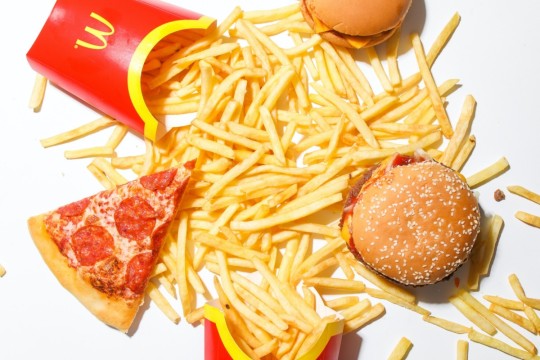
Exploitative KKKapitalism = Eating like 💩 in the neighborhood! "Studies have shown that the prevalence of fast-food restaurants is positively correlated with the percentage of Black residents in urban neighborhoods in the U.S. Similar trends have been found for liquor stores."
$Anything for a Dollar$
"While dollar stores can fill a need in low-income neighborhoods, they are often regarded as predatory businesses that harm communities more than they benefit them, due to very low wages, displacing other grocery options while failing to sell fresh food, store design that increases the rate of armed robberies, and OSHA and FDA violations that put customers and employees at risk."
Who Needs Fresh Food?

"There are no fresh vegetables, fruits, or meats in most dollar stores. And yet, as limited as their offerings are, dollar stores are now feeding more Americans than Whole Foods is, and they’re multiplying rapidly. Since 2011, the number of dollar stores nationwide has climbed from about 20,000 to nearly 30,000. There are now more dollar stores than Walmart and McDonalds locations combined."
Dollar Tree Customers = Permanent Underclass
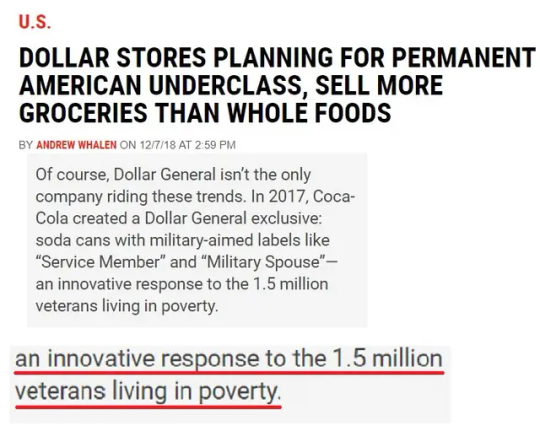
"In their latest annual reports, Dollar General and Dollar Tree say they have identified thousands of new locations for dollar stores. The two chains are planning to expand their combined empires to more 50,000 outlets."
“Essentially what the dollar stores are betting on in a large way is that we are going to have a permanent underclass in America,” Garrick Brown, a researcher with the commercial real estate firm Cushman & Wakefield, told Bloomberg last year.
“The economy is continuing to create more of our core customer,” Dollar General chief executive Todd Vasos told investors last year.

"More than one-third of American adults, and 48 percent of African American adults, are obese."
13% of the US population is Black, and 48% of Black Americans are obese.
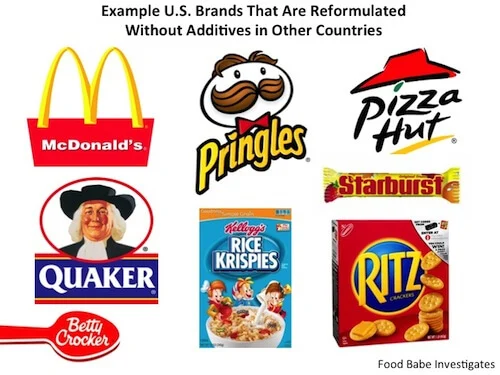
"Look at the pharmaceutical companies. In my neighborhood, there is a fast-food restaurant on every block, from Wendy’s to Kentucky Fried Chicken to Popeye’s to Little Caesar’s Pizza. Now drugstores are popping up on every corner, too. So you have the fast-food restaurants that of course cause the diet-related diseases, and you have the pharmaceutical companies there to fix it."

"If you give people access to really good food and a living-wage job, someone is going to lose money. As long as people are poor and as long as people are sick, there are jobs to be made. Follow the money."

"I talk about power, and how power is a drug and power over people is a drug and it’s hard to give up."

"A substantial body of evidence indicates that diet, toxic metals, food additives, insufficient nutrients, food allergy, lack of exercise can all contribute to criminal behavior. Evidence is mounting that a good diet makes a positive difference when working with some offenders."
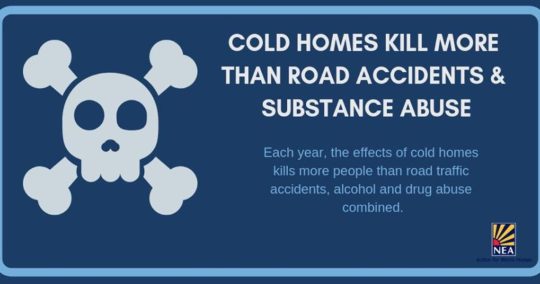
"Our estimates imply that the 42% drop in the natural gas price in the late 2000s, mostly driven by the shale gas boom, averted 12,500 deaths per year in the United States."

"Participants (60.55%) experienced unexpected or increased medical expenses (17.69%), job loss (13.64%), pay reduction (11.85%), and death of a family member (9.09%). Pay reduction and increased debt were associated with moderate hunger; death of a family member, pay reduction, and increased debt were associated with severe hunger."
Lung Cancer to Avoid Severe Hunger

"In unadjusted models, annual household income <$15,000, non-urban residence, lack of health insurance, unstable housing, heavier food pantry reliance, fair or poor adult health, adult anxiety, and adult smoking to reduce hunger pangs were all positively associated with VLFS-C."
Fast Food = Fast Death

"Survey respondents had 8 ± 7 fast-food outlets within 2 miles of their home. Individuals living in close proximity to fast-food restaurants had higher BMIs, and lower fruit and vegetable consumption."
Happy Meal = Psychiatric Distress & Violence

"Consumption of fast food has been linked to psychiatric distress, violent behaviors, and impulsivity in adolescents."

"The analysis found that liquor stores are disproportionately located in predominantly black neighborhoods, even after controlling for census tract socioeconomic status."

"At equal levels of poverty, Black neighborhoods had the fewest supermarkets."
#anti capitalism#socialism#social justice#black lives matter#anti capitalist#corporatism#cronyism#socialist#food insecurity#racial justice#predatory#exploitation#fast food#addiction#dollar store#poverty#late stage capitalism#obesity#big pharma#globalist agenda#living wage#food addiction#food additives#low income#alcohol
40 notes
·
View notes
Text
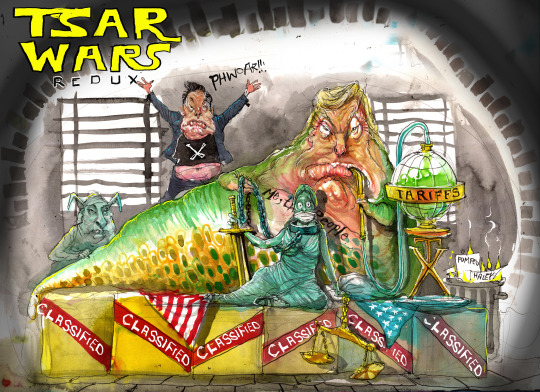
David Rowe
* * * *
Fuck the media explanations that Trump won because he was talking to them about the economy, because he was talking to them primarily about himself in his bizarre monologues that also covered the dick size of a dead golfer whose career peaked sixty years ago, windmills killing birds, kids coming home from school having had their gender changed maybe during recess, and a whole lot of Hannibal Lecter apparently because in the broken jelly of his brain there was some kind of association between insane asylums and refugees seeking asylum, and on top of that a lot of threats against and menace to women and anyone who opposed him, juvenile insults, and a whole thing about sharks and batteries, and a certain amount of slurring words and a whole lot of words in no particular order conveying no particular meaning, along with the promise to put the world's richest man in charge of the economy, who in turn promises to wreck it.
I get that there's a lot of economic unhappiness and real struggle, but that didn't start with the Biden Administration, which gave people pandemic relief at the beginning of its term, but Republicans wouldn't let them renew it, which is why people remember being better off four years ago. Meanwhile the Harris campaign promised to help with in-home healthcare, the cost of housing, and raising the minimum wage, and I know no one knew that any of these campaigns had content because the media was too busy rewarming frozen scandals. But also a lot of people got good green jobs from the Inflation Reduction Act and a lot of people got debt forgiveness, both Biden administration things that began as, respectively, the Sunrise Movement's Green New Deal and the debt activism that emerged from Occupy Wall Street (I've been thinking back to Occupy Wall and how it created space in 2011 for people to reveal how crushed by housing, medical, and student debt they were--Harris went after predatory housing lenders after Occupy, when she was California's attorney general.) Biden, who clearly modeled himself after FDR, was hailed in some quarters as the first non-neoliberal president since Reagan came 44 years ago to destroy the New Deal and the Great Society and make the poor poorer and the rich richer.
It is its own form of disinformation, how the mainstream media settles on explanations about what just happened and why when they happen not to be true. And we heard the same bullshit in 2016 when mostly white people voted against their own economic interest for a racist, sexist, incompetent member of the 1% and middle class people claiming to speak for the working class insisted this was all economic dissatisfaction. Trump is a puppet for forces that will make ordinary peoples' lives far harder and then they will blame Antifa or immigrants or something and the media will repeat these ridiculous allegations as though they deserve serious consideration.
One point no one should forget: abortion is an economic issue for anyone who can get pregnant. Immigrant rights are not just an economic issue for immigrants but for the whole economy, which would fall apart without them.
Brookings Institute: "The Trump campaign decided that Harris’ stance on transgender issues was the Willie Horton of 2024 and invested heavily in negative advertising that dominated the airwaves throughout the South.1 Anecdotal evidence suggests that this campaign helped weaken Harris’ effort to portray herself as a common-sense center-left candidate rather than an emissary from San Francisco."
Wired: "Trump ran a campaign that stoked culture war grievances and divisions, and was defined by lies, a desire for vengeance, and, at times, threatening rhetoric. In social media posts he threatened mass arrests of his political opponents in revenge for “stealing the election” in 2020 (though evidence conclusively shows the 2020 election was not stolen). Lawmakers, election workers, school board members, federal agents, and judges have been repeatedly targeted over the years with violent threats by his supporters who believe they were acting on his behalf. Trump repeatedly promised his supporters he would “destroy” the deep state, invoking the popular conspiracy theory of a nefarious web of faceless bureaucrats working to destroy the US from within. He cast himself, alongside the people who stormed the Capitol on January 6 over election lies, as “political prisoners,” even “hostages” who were being persecuted by a “tyrannical” Biden administration."
Robert Hubbell: "Just as the media normalized Trump before the election, there is a wholesale effort to “normalize” the election results. Pundits are claiming the election was decided by voters’ concerns over inflation, immigration, or crime. Those issues are post-facto rationalizations offered by voters to conceal their real reasons for voting for a convicted felon and adjudicated sexual abuser over an eminently qualified candidate."
Brian Merchant, tech journalist extraordinaire: "Apart from Trump himself, there are few more obvious victors that Elon Musk; for $100 million or so and a few months’ display of unrestrained fealty, he just bought himself some real estate in the inner sanctum of Trumpworld. It may be the most fruitful investment he ever made, a bargain really. ...Suffice to say that Elon Musk is the closest that a Silicon Valley tech titan has been to the White House, in a position of overt and direct power. There is of course a long lineage of the Valley linking up with Washington for defense contracts, help in avoiding regulations, and other forms of material support—see: Malcolm Harris’s Palo Alto—but this is the next level. It could even, perhaps, be considered a logical culmination. It’s time to face facts. In Trump, Silicon Valley got what it wanted: A president that will kneecap antitrust efforts, embrace deregulation, and defang labor laws."
[Rebecca Solnit]
#Rebecca Solnit#election 2024#David Rowe#political cartoons#misinformation#media normalized Trump#normalize the election results#musk#Silicon Valley
10 notes
·
View notes
Text
I had another conversation with someone who didn't have health insurance today about ACA that she didn't know existed as an option. Ever since I got my first ACA plan last year after turning 26 I have been a big ACA fan because this piece of landmark legislation is the reason I have health insurance instead of being in thousands of dollars of medical debt. It bugs the ever living shit out of me whenever I see internet leftists saying things like "the ACA didn't do anything because it is not medicare for all." It really speaks to me about the privilege that these people likely have because they're not noticing the amount of monumental positive change and harm reduction that was made by the bill.
The ACA is a bill that is comprehensive, and walks, talks, and chews gum at the same time, and I think a lot of people who are either a.) too young to remember how health insurance in this country worked before the ACA or b.) have not had to get government subsidized health insurance because they have always had either their parents' insurance or employer insurance really and truly don't get it. I am obviously too young to remember how healthcare worked before the ACA because I am under 30, but I do have a mom who works in healthcare and lots of older relatives that talk about it a lot so I was pretty familiar with the concept despite this.
I am low-income, in school, and have an employer that doesn't offer me employer subsidized plans, so the ACA quickly became pretty important to me as a person with lifelong disability, higher than normal cancer predisposition and a need for lifelong psychiatric care.
Also, if you are in your 20s but under 26 and still on your parents' health insurance? Bam! You are directly benefiting from the ACA. Before the ACA you would not have been able to be on your parents insurance plan in your 20s.
Some things that the ACA did:
Made it affordable for people who are above the medicaid income limit and/or self-employed to independently purchase health insurance. Before the ACA premiums for independently purchased health plans could be $500+ for individual plans! If you were one of the many Americans who worked multiple part-time jobs that did not provide PT employees with insurance, you were basically fucked and uninsured. If you were a small business or self-employed, you were also fucked. The creation of the healthcare dot gov health insurance marketplace, which is open to anyone was a massive success of the bill, and millions of Americans benefit from it. During open enrollment (or after a specific life event such as "turned 26," or "became unemployed") a person can log on to health care dot gov, see a wide range of plans, and purchase one. The government then provides you with a premium subsidy (which is what your employer does for you if you have an employer plan) to lower the cost of the premium. Subsidies are calculated based on a person's income so people with lower incomes get higher subsidies.
Obviously there is some nuance, and a coverage gap with ACA plans for individuals who make above $60,000 (and are not a small business obtaining a group contract with an insurance company) where premiums are still very expensive because they are ineligible for the majority of the premium tax subsidy, which is a major ACA weakness, but for everyone in the $30,000-$55,000 gap and for owners of small businesses that want to offer plans for their employees, the benefits are huge. I am able to get a PPO with a low deductible, low OOP for less than $200/mo in premiums! There is exactly zero way that I would have been able to do that if I were trying to get insured pre-ACA.
Made it so that insurance companies could not discriminate against patients with so-called pre-existing conditions — so basically if you are disabled, the insurance company can no longer: a.) decline to provide you coverage or b.) increase your premiums/ reduce your plan benefits because you have a disability or get something like, oh, idk, FUCKING CANCER. Like there were people who got cancer and found out that their insurer dropped them because they did not want to pay out for expensive cancer treatment. That was a thing that was legal for health insurance companies to do before the ACA, and they fucking did that. The pre-existing conditions clause was one of the biggest benefits that has been touted since the beginning of the bill's conception and passage. Under the ACA, all health insurance companies are banned from denying plan applications for any reason, or from revoking plan coverage for any reason that isn't "patient stopped paying their premium." Made it so that children could stay on their parents' health insurance plans until they were 26 instead of being booted at 18. Made it so that all plans must provide some level of coverage for a list of specific EHBs (Essential Health Benefits) such as "emergency room care," "prenatal and pregnancy related care," "preventative care such as doctor recommended cancer screenings for patients" "office visits with general practitioners," etc.
If you have an marketplace plan or medicare/medicaid, that plan MUST provide you with contraceptives at no cost to you regardless of whether or not you have met your deductible. Democrats also wanted this to be true for all other plans, but unfortunately in 2014, whacko religious conservatives got themselves an exemption for "companies with fervently held religious beliefs against contraception" from providing this coverage in their employer subsidized plans in the bullshit case of Burwell v. Hobby Lobby Stores, Inc., which was decided by a conservative majority vote in the Supreme Court. A case which had other broad and shitty implications btw, and which is yet another example of why allowing weird conservatives to get elected to the presidency is bad for America. btw, in the original intention of the ACA they wanted to also include mandatory coverage for abortion services. Unfortunately, the Republicans (and a group of stupid pro-life dems who suck, and to my knowledge are not in congress now) torpedoed this provision despite Nancy Pelosi's best efforts and refused to pass the bill at all as long as this provision remained in it. Reason #10000000 Republicans suck.
Lots more that I'm not naming here, but I hope you get the idea. My point is that even though ACA was not a medicare for all bill, it was a landmark (and very needed) piece of healthcare reform legislation that changed a lot about the landscape of health insurance in America. Tragically, right wing and far left smearing of it has obscured the truth about the many good things that the bill did do. Was it perfect? Absolutely the fuck not! Even Obama himself admits this. What it was was a major victory against injustices in the system, and a massive piece of harm reduction legislation, and I wish that more Americans credited it for the things it did do.
Dems managed to get the bill passed with the vast majority of their highest priorities still in it despite major republic ratfuckery combined with a minority of independents and dems who sucked. Pelosi walked circles around these fuckers day and night to get this bill passed, and I for one am deeply grateful. Because of the ACA I can get the healthcare that I desperately need as a disabled person with higher than normal cancer risk. I can get my desperately needed medications and see all of my doctors because of this piece of legislation. I was able to get surgery to remove CANCER from my body becuase of this legislation, so yeah, fuck everyone going "the ACA is bad because it's not perfect medicare for all." Girl (gender neutral), I (and many other people) would not be surviving if it were not for this bill, and I for one, think that that is a whole heck of a lot better than all of us dying because y'all want to wait for perfect legislation. Harm reduction is good and is an important step on the road to bigger and better change. Universal health care has risen to more popular and broad public opinion/knowledge because the ACA passed.
Yeah, anyways this is rant about how fucking stupid anti-ACA people are. To deny the gains of meaningful healthcare reform is a clear sign of privilege, ignorance, and tunnel vision that lets perfect be the enemy of good or better.
This is also a post about a clear and obvious way that Dems are infinitely different (and better) than republicans. Voting dem is harm reduction. Not voting, voting third party or protest write in voting is a vote for republicans. And republicans??? They give exactly zero shits about anyone other than themselves. They support stupid and insane religious conservative politics, and look to fuck over the American people (and everyone else abroad) at every turn because they don't believe in helping people; their convictions are all about hate, prejudice, fearmongering, and a right-wing Christian Theocracy. They would rather see millions of people die than give dems a win, because they are spiteful and hateful. They want us to be afraid, disengaged, disorganized and fighting one another, because their ideas, convictions and beliefs are deeply unpopular, and if we organize against them, they will lose.
#long post for ts#aca#affordable care act#us pol#pol#margaret babbles#I don't care if this is controversial opinion here on tumblr dot com#it's something that needs saying and I am going to say out loud till the cows come home because it's the truth#and we have the truth on our side while they have lies fear and hate
6 notes
·
View notes
Text
Rebecca Solnit / Facebook:
Fuck the media explanations that Trump won because he was talking to them about the economy, because he was talking to them primarily about himself in his bizarre monologues that also covered the dick size of a dead golfer whose career peaked sixty years ago, windmills killing birds, kids coming home from school having had their gender changed maybe during recess, and a whole lot of Hannibal Lecter apparently because in the broken jelly of his brain there was some kind of association between insane asylums and refugees seeking asylum, and on top of that a lot of threats against and menace to women and anyone who opposed him, juvenile insults, and a whole thing about sharks and batteries, and a certain amount of slurring words and a whole lot of words in no particular order conveying no particular meaning, along with the promise to put the world's richest man in charge of the economy, who in turn promises to wreck it.
I get that there's a lot of economic unhappiness and real struggle, but that didn't start with the Biden Administration, which gave people pandemic relief at the beginning of its term, but Republicans wouldn't let them renew it, which is why people remember being better off four years ago. Meanwhile the Harris campaign promised to help with in-home healthcare, the cost of housing, and raising the minimum wage, and I know no one knew that any of these campaigns had content because the media was too busy rewarming frozen scandals. But also a lot of people got good green jobs from the Inflation Reduction Act and a lot of people got debt forgiveness, both Biden administration things that began as, respectively, the Sunrise Movement's Green New Deal and the debt activism that emerged from Occupy Wall Street (I've been thinking back to Occupy Wall and how it created space in 2011 for people to reveal how crushed by housing, medical, and student debt they were--Harris went after predatory housing lenders after Occupy, when she was California's attorney general.) Biden, who clearly modeled himself after FDR, was hailed in some quarters as the first non-neoliberal president since Reagan came 44 years ago to destroy the New Deal and the Great Society and make the poor poorer and the rich richer.
It is its own form of disinformation, how the mainstream media settles on explanations about what just happened and why when they happen not to be true. And we heard the same bullshit in 2016 when mostly white people voted against their own economic interest for a racist, sexist, incompetent member of the 1% and middle class people claiming to speak for the working class insisted this was all economic dissatisfaction. Trump is a puppet for forces that will make ordinary peoples' lives far harder and then they will blame Antifa or immigrants or something and the media will repeat these ridiculous allegations as though they deserve serious consideration.
One point no one should forget: abortion is an economic issue for anyone who can get pregnant. Immigrant rights are not just an economic issue for immigrants but for the whole economy, which would fall apart without them.
Brookings Institute: "The Trump campaign decided that Harris’ stance on transgender issues was the Willie Horton of 2024 and invested heavily in negative advertising that dominated the airwaves throughout the South.1 Anecdotal evidence suggests that this campaign helped weaken Harris’ effort to portray herself as a common-sense center-left candidate rather than an emissary from San Francisco."
Wired: "Trump ran a campaign that stoked culture war grievances and divisions, and was defined by lies, a desire for vengeance, and, at times, threatening rhetoric. In social media posts he threatened mass arrests of his political opponents in revenge for “stealing the election” in 2020 (though evidence conclusively shows the 2020 election was not stolen). Lawmakers, election workers, school board members, federal agents, and judges have been repeatedly targeted over the years with violent threats by his supporters who believe they were acting on his behalf. Trump repeatedly promised his supporters he would “destroy” the deep state, invoking the popular conspiracy theory of a nefarious web of faceless bureaucrats working to destroy the US from within. He cast himself, alongside the people who stormed the Capitol on January 6 over election lies, as “political prisoners,” even “hostages” who were being persecuted by a “tyrannical” Biden administration."
Robert Hubbell: "Just as the media normalized Trump before the election, there is a wholesale effort to “normalize” the election results. Pundits are claiming the election was decided by voters’ concerns over inflation, immigration, or crime. Those issues are post-facto rationalizations offered by voters to conceal their real reasons for voting for a convicted felon and adjudicated sexual abuser over an eminently qualified candidate."
Brian Merchant, tech journalist extraordinaire: "Apart from Trump himself, there are few more obvious victors that Elon Musk; for $100 million or so and a few months’ display of unrestrained fealty, he just bought himself some real estate in the inner sanctum of Trumpworld. It may be the most fruitful investment he ever made, a bargain really. ...Suffice to say that Elon Musk is the closest that a Silicon Valley tech titan has been to the White House, in a position of overt and direct power. There is of course a long lineage of the Valley linking up with Washington for defense contracts, help in avoiding regulations, and other forms of material support—see: Malcolm Harris’s Palo Alto—but this is the next level. It could even, perhaps, be considered a logical culmination. It’s time to face facts. In Trump, Silicon Valley got what it wanted: A president that will kneecap antitrust efforts, embrace deregulation, and defang labor laws."
3 notes
·
View notes
Text
Human Health Advocates - Reducing Medical Debt & Overcoming Insurance Denials Since 2015
Human Health Advocates, founded in 2015, specializes in reducing medical debt and overcoming insurance denials. With around 100 successful negotiations across various states, they have helped numerous patients lower their medical expenses. Their services include understanding medical bills, resolving contested situations, and negotiating with hospitals and insurance companies.
#Medical debt reduction#insurance denial resolution#medical bill negotiation#patient advocacy#hospital debt negotiation#healthcare billing assistance#medical debt advocates#health insurance help.
0 notes
Text
HOMIES… if all goes well it looks like i’ll be getting top surgery around the end of october this year!!
it truly doesn’t feel real.. i’ve been on the waitlist since the day i asked my doctor if i could start testosterone. in between now and then i was referred for and had an entire fricking hysterectomy. i gave up waiting on top surgery to mitigate my back pain and started physiotherapy. the last straw that even made me seek physical transition was reading about medically necessary breast reductions and feeling dysphoric enough about all the talk of shaping breasts to look “””feminine””” that i realized i’d much rather get top surgery than a reduction.
i’m gonna have to go into medical debt if i can’t get my mom to pay for the part that isn’t covered by ohip which is scary… but it’s really going to feel possible to present as a man once it’s done ;u; and my poor deteriorating back is finally gonna catch a goddamn break!!! i’ve asked the surgeon for like A cups bc with my body weight i’d rather have fat guy boobs than be completely flat.. ya boy’s finally gonna throw these godforsaken N cups in the gd trash !
4 notes
·
View notes
Text
The Taliban government in Afghanistan – the nation that until recently produced 90% of the world’s heroin – has drastically reduced opium cultivation across the country. Western sources estimate an up to 99% reduction in some provinces. This raises serious questions about the seriousness of U.S. drug eradication efforts in the country over the past 20 years. And, as global heroin supplies dry up, experts tell MintPress News that they fear this could spark the growing use of fentanyl – a drug dozens of times stronger than heroin that already kills more than 100,000 Americans yearly.
[...]
The Taliban’s successful campaign to eradicate drug production has cast a shadow of doubt over the effectiveness of American-led endeavors to achieve the same outcome. “It prompts the question, ‘What were we actually accomplishing there?!'” remarked Hoh, underscoring:
This undermines one of the fundamental premises behind the wars: the alleged association between the Taliban and the drug trade – a concept of a narco-terror nexus. However, this notion was fallacious. The reality was that Afghanistan was responsible for a staggering 80-90% of the world’s illicit opiate supply. The primary controllers of this trade were the Afghan government and military, entities we upheld in power.”
Hoh clarified that he never personally witnessed or received any reports of direct involvement by U.S. troops or officials in narcotics trafficking. Instead, he contended that there existed a “conscious and deliberate turning away from the unfolding events” during his tenure in Afghanistan.’
Suzanna Reiss, an academic at the University of Hawaii at Manoa and the author of “We Sell Drugs: The Alchemy of U.S. Empire,” demonstrated an even more cynical perspective on American counter-narcotics endeavors as she conveyed to MintPress:
The U.S. has never really been focused on reducing the drug trade in Afghanistan (or elsewhere for that matter). All the lofty rhetoric aside, the U.S. has been happy to work with drug traffickers if the move would advance certain geopolitical interests (and indeed, did so, or at least turned a knowingly blind eye, when groups like the Northern Alliance relied on drugs to fund their political movement against the regime.).”
Afghanistan’s transformation into a preeminent narco-state owes a significant debt to Washington’s actions. Poppy cultivation in the 1970s was relatively limited. However, the tide changed in 1979 with the inception of Operation Cyclone, a massive infusion of funds to Afghan Mujahideen factions aimed at exhausting the Soviet military and terminating its presence in Afghanistan. The U.S. directed billions toward the insurgents, yet their financial needs persisted. Consequently, the Mujahideen delved into the illicit drug trade. By the culmination of Operation Cyclone, Afghanistan’s opium production had soared twentyfold. Professor Alfred McCoy, acclaimed author of “The Politics of Heroin: CIA Complicity in the Global Drug Trade,” shared with MintPress that approximately 75% of the planet’s illegal opium output was now sourced from Afghanistan, a substantial portion of the proceeds funneling to U.S.-backed rebel factions.
Unraveling the Opioid Crisis: An Impending Disaster
The opioid crisis is the worst addiction epidemic in U.S. history. Earlier this year, Department of Homeland Security Secretary Alejandro Mayorkas described the American fentanyl problem as “the single greatest challenge we face as a country.” Nearly 110,000 Americans died from drug overdoses in 2021, fentanyl being by far the leading cause. Between 2015 and 2021, the National Institute of Health recorded a nearly 7.5-fold increase in overdose deaths. Medical journal The Lancet predicts that 1.2 million Americans will die from opioid overdoses by 2029.
U.S. officials blame Mexican cartels for smuggling the synthetic painkiller across the southern border and China for producing the chemicals necessary to make the drug.
White Americans are more likely to misuse these types of drugs than other races. Adults aged 35-44 experience the highest rates of deaths, although deaths among younger people are surging. Rural America has been particularly hard hit; a 2017 study by the National Farmers Union and the American Farm Bureau Federation found that 74% of farmers have been directly impacted by the opioid epidemic. West Virginia and Tennessee are the states most badly hit.
For writer Chris Hedges, who hails from rural Maine, the fentanyl crisis is an example of one of the many “diseases of despair” the U.S. is suffering from. It has, according to Hedges, “risen from a decayed world where opportunity, which confers status, self-esteem and dignity, has dried up for most Americans. They are expressions of acute desperation and morbidity.” In essence, when the American dream fizzled out, it was replaced by an American nightmare. That white men are the prime victims of these diseases of despair is an ironic outgrowth of our unfair system. As Hedges explained:
White men, more easily seduced by the myth of the American dream than people of color who understand how the capitalist system is rigged against them, often suffer feelings of failure and betrayal, in many cases when they are in their middle years. They expect, because of notions of white supremacy and capitalist platitudes about hard work leading to advancement, to be ascendant. They believe in success.”
In this sense, it is important to place the opioid addiction crisis in a wider context of American decline, where opportunities for success and happiness are fewer and farther between than ever, rather than attribute it to individuals. As the “Lancet” wrote: “Punitive and stigmatizing approaches must end. Addiction is not a moral failing. It is a medical condition and poses a constant threat to health.”
A “Uniquely American Problem”
Nearly 10 million Americans misuse prescription opioids every year and at a rate far higher than comparable developed countries. Deaths due to opioid overdose in the United States are ten times more common per capita than in Germany and more than 20 times as frequent in Italy, for instance.
Much of this is down to the United States’ for-profit healthcare system. American private insurance companies are far more likely to favor prescribing drugs and pills than more expensive therapies that get to the root cause of the issue driving the addiction in the first place. As such, the opioid crisis is commonly referred to as a “uniquely American problem.”
Part of the reason U.S. doctors are much more prone to doling out exceptionally strong pain medication relief than their European counterparts is that they were subject to a hyper-aggressive marketing campaign from Purdue Pharma, manufacturers of the powerful opioid OxyContin. Purdue launched OxyContin in 1996, and its agents swarmed doctors’ offices to push the new “wonder drug.”
Yet, in lawsuit after lawsuit, the company has been accused of lying about both the effectiveness and the addictiveness of OxyContin, a drug that has hooked countless Americans onto opioids. And when legal but incredibly addictive prescription opioids dry up, Americans turned to illicit substances like heroin and fentanyl as substitutes.
Purdue Pharma owners, the Sackler family, have regularly been described as the most evil family in America, with many laying the blame for the hundreds of thousands of overdose deaths squarely at their door. In 2019, under the weight of thousands of lawsuits against it, Purdue Pharma filed for bankruptcy. A year later, it plead guilty to criminal charges over its mismarketing of OxyContin.
Nevertheless, the Sacklers made out like bandits from their actions. Even after being forced last year to pay nearly $6 billion in cash to victims of the opioid crisis, they remain one of the world’s richest families and have refused to apologize for their role in constructing an empire of pain that has caused hundreds of thousands of deaths.
Instead, the family has attempted to launder their image through philanthropy, sponsoring many of the most prestigious arts and cultural institutions in the world. These include the Guggenheim Museum and the Metropolitan Museum of Art in New York City, Yale University, and the British Museum and Royal Academy in London.
One group who are disproportionately affected by opioids like OxyContin, heroin and fentanyl are veterans. According to the National Institutes of Health, veterans are twice as likely to die from overdose than the general population. One reason for this is bureaucracy. “The Veterans Administration did a really poor job in the past decades with their pain management, particularly their reliance on opioids,” Hoh, a former marine, told MintPress, noting that the V.A. prescribed dangerous opioids at a higher rate than other healthcare agencies.
Ex-soldiers often have to cope with chronic pain and brain injuries. Hoh noted that around a quarter-million veterans of Afghanistan and Iraq have traumatic brain injuries. But added to that are the deep moral injuries many suffered – injuries that typically cannot be seen. As Hoh noted:
Veterans are turning to [opioids like fentanyl] to deal with the mental, emotional and spiritual consequences of the war, using them to quell the distress, try to find some relief, escape from the depression, and deal with the demons that come home with veterans who took part in those wars.”
Thus, if the Taliban’s opium eradication program continues, it could spark a fentanyl crisis that might kill more Americans than the 20-year occupation ever did.
Broken Society
If diseases of despair are common throughout the United States, they are rampant in Afghanistan itself. A global report released in March revealed that Afghans are by far the most miserable people on Earth. Afghans evaluated their lives at 1.8 out of 10 – dead last and far behind the top of the pile Finland (7.8 out of 10).
Opium addiction in Afghanistan is out of control, with around 9% of the adult population (and a significant number of children) addicted. Between 2005 and 2015, the number of adult drug users jumped from 900,000 to 2.4 million, according to the United Nations, which estimates that almost one in three households is directly affected by addiction. As opium is frequently injected, blood-transmitted conditions like HIV are common as well.
The opioid problem has also spilled into neighboring countries such as Iran and Pakistan. A 2013 United Nations report estimated that almost 2.5 million Pakistanis were abusing opioids, including 11% of people in the northwestern province of Khyber Pakhtunkhwa. Around 700 people die each day from overdoses.
Empire of Drugs
Given their history, It is perhaps understandable that Asian nations have generally taken far more authoritarian measures to counter drug addiction issues. For centuries, using the illegal drug trade to advance imperial objectives has been a common Western tactic. In the 1940s and 1950s, the French utilized opium crops in the “Golden Triangle” region of Southeast Asia in order to counter the growing Vietnamese independence movement.
A century previously, the British used opium to crush and conquer much of China. Britain’s insatiable thirst for Chinese tea was beginning to bankrupt the country, seeing as China would only accept gold or silver in exchange. The British, therefore, used the power of its navy to force China to cede Hong Kong to it. From there, it flooded mainland China with opium grown in South Asia (including Afghanistan).
The effect of the Opium War was astonishing. By 1880, the British were inundating China with more than 6,500 tons of opium per year – the equivalent of many billions of doses. Chinese society crumbled, unable to deal with the empire-wide social and economic dislocation that millions of opium addicts brought. Today, the Chinese continue to refer to the period as the “century of humiliation”.
Meanwhile, in South Asia, the British forced farmers to plant poppy fields instead of edible crops, causing waves of giant famines, the likes of which had never been seen before or since.
And during the 1980s in Central America, the United States sold weapons to Iran in order to fund far-right Contra death squads. The Contras were deeply implicated in the cocaine trade, fuelling their dirty war through crack cocaine sales in the U.S. – a practice that, according to journalist Gary Webb, the Central Intelligence Agency facilitated.
Imperialism and illicit drugs, therefore, commonly go together. However, with the Taliban opium eradication effort in full effect, coupled with the uniquely American phenomenon of opioid addiction, it is possible that the United States will suffer significant blowback in the coming years. The deadly fentanyl epidemic will likely only get worse, needlessly taking hundreds of thousands more American lives. Thus, even as Afghanistan attempts to rid itself of its deadly drug addiction problem, its actions could precipitate an epidemic that promises to kill more Americans than any of Washington’s imperial endeavors to date.
Feature photo | Illustration by MintPress News
Alan MacLeod is Senior Staff Writer for MintPress News. After completing his PhD in 2017 he published two books: Bad News From Venezuela: Twenty Years of Fake News and Misreporting and Propaganda in the Information Age: Still Manufacturing Consent, as well as a number of academic articles. He has also contributed to FAIR.org, The Guardian, Salon, The Grayzone, Jacobin Magazine, and Common Dreams.
#afghanistan#taliban#war on drugs#fentanyl#heroine#us occupation of afghanistan#us imperialism#diseases of despair#drug trade
26 notes
·
View notes
Text
Mastering Your Finances: A Roadmap to Long-Term Financial Health
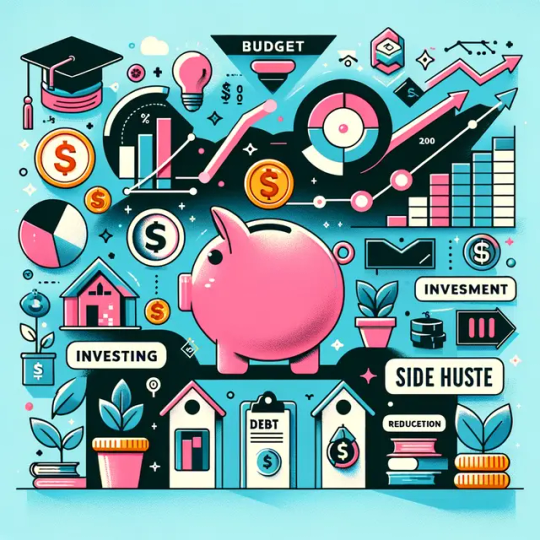
Introduction
Achieving financial stability is a crucial step toward a secure and stress-free life. Effective financial management enables you to avoid debt, save for the future, and make informed investment decisions. In this comprehensive guide, we will explore practical tips and strategies to help you master your finances and achieve long-term financial health.
Section 1: Building a Strong Financial Foundation
A solid financial foundation is akin to the bedrock of a grand architectural marvel. Without it, the structure above cannot stand tall and resilient against the test of time.
Spend Less Than You Earn The cornerstone of financial stability lies in the principle of spending less than you earn. Much like the conservation of energy, where output should not exceed input, your financial health thrives when your expenditures are less than your income. Begin by meticulously tracking your expenses. Utilize tools like budgeting apps or a simple spreadsheet to categorize and monitor every dollar spent. Create a budget that aligns with your financial goals, allowing you to live within your means and avoid unnecessary debt.
Emergency Fund An emergency fund serves as your financial safety net, a buffer against life's unpredictable events. Aim to save 3-6 months' worth of living expenses in an easily accessible account. This fund acts as a safeguard, ensuring you can navigate unexpected expenses, such as medical bills or car repairs, without derailing your financial progress. The importance of this fund cannot be overstated, as it provides peace of mind and stability in turbulent times.
Section 2: Investing Wisely
Investing is the art and science of making your money work for you. However, like any scientific endeavor, it requires careful research, understanding, and strategic planning.
Understand Before You Invest Before diving into the world of investments, take the time to understand the various options available. Whether it's stocks, bonds, real estate, or other assets, each investment vehicle comes with its own set of risks and rewards. Conduct thorough research and consider seeking advice from a financial advisor. Their expertise can provide valuable insights and help you make informed decisions.
Don't Invest More Than You Can Afford to Lose A cardinal rule in investing is to never put at risk more money than you can afford to lose. Diversification is your ally in mitigating risk. Spread your investments across different asset classes and sectors to minimize the impact of any single investment's poor performance. This approach, known as diversification, enhances the stability and potential growth of your portfolio.
Section 3: Managing Debt Effectively
Debt, if managed wisely, can be a tool for growth. However, if left unchecked, it can become a burden that stifles financial progress.
Good Debt vs. Bad Debt Not all debt is created equal. Good debt, such as student loans or mortgages, can be considered investments in your future. They often come with lower interest rates and have the potential to increase your earning power or net worth. Conversely, bad debt, like high-interest credit card debt, can quickly spiral out of control. Focus on paying off high-interest debt first to free yourself from its financial stranglehold.
Debt Reduction Strategies There are several effective strategies for reducing debt. The snowball method involves paying off your smallest debts first, providing a psychological boost as you eliminate balances one by one. The avalanche method focuses on paying off debts with the highest interest rates first, saving you money on interest over time. Consider consolidating your debt into lower-interest loans or credit cards to make your payments more manageable.
Section 4: Boosting Your Income
Increasing your income is a proactive approach to achieving financial goals faster. It provides additional resources to save, invest, and pay off debt.
Side Hustles and Freelancing In today's gig economy, opportunities for side hustles and freelance work abound. Whether it's driving for a rideshare service, offering consulting services, or starting an online business, additional income streams can significantly enhance your financial situation. This extra income can be directed towards debt reduction, savings, or investments, accelerating your journey towards financial stability.
Investing in Yourself Your most valuable asset is yourself. Investing in your education and skills can have long-term benefits for your career and earning potential. Consider taking courses, attending workshops, or gaining certifications in your field. Continuous personal and professional development not only enhances your employability but also opens doors to higher income opportunities.
Section 5: Reducing Expenses and Saving Money
Reducing expenses is akin to tightening the bolts on a well-oiled machine. Every bit of savings contributes to smoother financial operations and long-term stability.
Cutting Unnecessary Costs Take a critical look at your spending habits and identify unnecessary expenses. Cancel subscriptions you no longer use, cook at home instead of dining out, and find ways to save on utilities and other monthly bills. Small changes in your spending habits can accumulate into significant savings over time.
Smart Shopping Adopt smart shopping strategies to maximize your savings. Compare prices, use coupons, and take advantage of sales to save money on everyday items. By being a savvy shopper, you can stretch your dollars further and make your budget work more efficiently.
Conclusion
Achieving financial stability requires a combination of smart spending, wise investing, and proactive debt management. By following these tips and staying committed to your financial goals, you can build a secure future and achieve long-term financial health. Remember to stay informed, adapt to changing circumstances, and celebrate your progress along the way.
Additional Resources
Consider consulting a financial advisor for personalized advice and guidance.
Utilize budgeting and investment apps to track your progress and stay on top of your finances.
Continuously educate yourself on personal finance and investing to make informed decisions.
In the grand tapestry of life, your financial health is a thread of paramount importance. With knowledge, discipline, and strategic planning, you can weave a future of stability, security, and prosperity.
Call to Action
Are you ready to take control of your financial future? Join our community at [Your Blog Name] for more in-depth articles and resources on financial management, investing, and achieving financial freedom. Don't forget to subscribe to our YouTube channel, [Unplugged Financial], where we dive into the history of money, explore the current financial landscape, and discuss how Bitcoin can revolutionize the financial world. Together, we can navigate the path to financial independence and create a brighter future.
Stay Connected:
Visit our blog: Bitcoin Revolution
Subscribe to our YouTube channel: Unplugged Financial
Let's learn, grow, and achieve financial freedom together!
#FinancialFreedom#MoneyManagement#InvestingTips#DebtFreeJourney#PersonalFinance#Budgeting#FinancialAdvice#SmartInvesting#EmergencyFund#SideHustles#FinancialStability#WealthBuilding#CryptoRevolution#Bitcoin#FinancialLiteracy#MoneyMatters#SaveMoney#IncreaseIncome#FrugalLiving#FinancialGoals#financial education#financial empowerment#financial experts#cryptocurrency#digitalcurrency#blockchain#finance#unplugged financial#globaleconomy
3 notes
·
View notes
Text
Harm reduction’s good and all but it’s so fucked that addicts/alcoholics are the ones getting support while their loved ones are left in the dust
Why is their drinking safely supervised while their debt comes out of our bank accounts? Why do they get clean needles while we have to pay for therapy to heal the trauma they’ve caused? Why do they get 30-day vacations in rehab while we have to pay for medical costs after they’ve hurt us?
Why do they get coddled like babies and told it’s not their fault while we have to suck it up, be responsible, and give our undying support?
3 notes
·
View notes